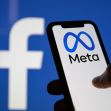Two companies have gone head-to-head over who has the right to use a logo they both see as defining the future of the internet. Meta Platforms Inc., formerly Facebook Inc., was sued by a nonprofit blockchain developer, Dfinity Foundation, over a new logo Meta adopted after rebranding late last year.
Both Meta and Dfinitiy aim to define the future of the internet, how it is created, how it is governed, and how people’s privacy is protected, or not. Dfinity Foundation filed a lawsuit in California this past week arguing that Meta’s new logo will confuse consumers with their own infinity symbol, hurting their business, and creating an unfair competition favoring Meta.
In the complaint, Dfinity argues that Meta is violating its rights under 15 U.S. Code § 1114, Trademark Infringement, and 15 U.S.C § 1125(a) False Designations of Origin. Dfnity, at the core of its argument, states that Meta’s use of its new logo “will cause confusion” because users could think that “Dfinity and its services are connected with, sponsored by, affiliated with or related to Meta,” a company which the foundation aims to minimize.
Dfinity is a privacy-focused business and complained that the similarity in the logos could confuse customers with Meta, a company Dfinity has claimed has a “sordid” history with user privacy. Founded in 2016, the Switzerland-based foundation is an “infinite” public blockchain network. The foundation aims to create a “blockchain singularity” where “every system and service is rebuilt and reimagined using smart contracts and runs entirely from infinite public blockchain without need for traditional IT.”
The foundation is also suing Meta for Common Law Unfair Competition and violation of California’s unfair competition laws. Dfinity publicly claims to want “to take on Big Tech and its growing control over user data and return the Internet back to its free and open roots,” one of the main reasons they have sued Meta for the use of a similar-looking logo. The fight over the use of an infinity symbol as a logo has become more about corridor reputation and ideas about the future of the internet, rather than about loss in profits.
The Complaint argues that Meta’s and Dfinity’s target audiences are the same, “those who are looking for an innovative and different internet experience, created by users, for users.” Additionally, Dfinity argues that the two companies also use the same marketing channels to find those targeted users, hurting Dfinity’s ability to provide an alternative to Meta’s vision of the future.
In October 2021, Facebook Inc. rebranded as Meta Platforms Inc., in a strategy to move away from just its online social media platform and to reflect its focus on developing the virtual reality “metaverse.” Meta describes its logo as a “continuous loop” that “symboliz infinite horizons in the metaverse,” which the company sees as the successor to the mobile internet we use today.
In October, CEO Mark Zuckerberg spoke at the company’s live-streamed virtual and augmented reality conference to unveil the new brand for the company. He stated that “right now, our brand is so tightly linked to one product that it can’t possibly represent everything that we’re doing today, let alone in the future.” Then, in December 2021, two months after Facebook Inc rebranded to Meta, Chief Technology Officer Andrew Bosworth transmitted an internal note to employees laying out a vision for the company to adopt blockchain technologies because it could have “profound impacts on industry over the next decade.”
Both companies believe that the future of the internet will be larger than it is now and more inclusive and interoperable. However, they differ on the extent of privacy provided to users and whether the internet should be centralized or decentralized. Meta works to create a centralized and closed system, according to Dfinity’s complaint, while “Dfinity’s focus is on decentralization and interoperability.” Therefore, “any association between Dfinity and Meta would cause consumers, including users and developers, to question Dfinity’s core mission.”






